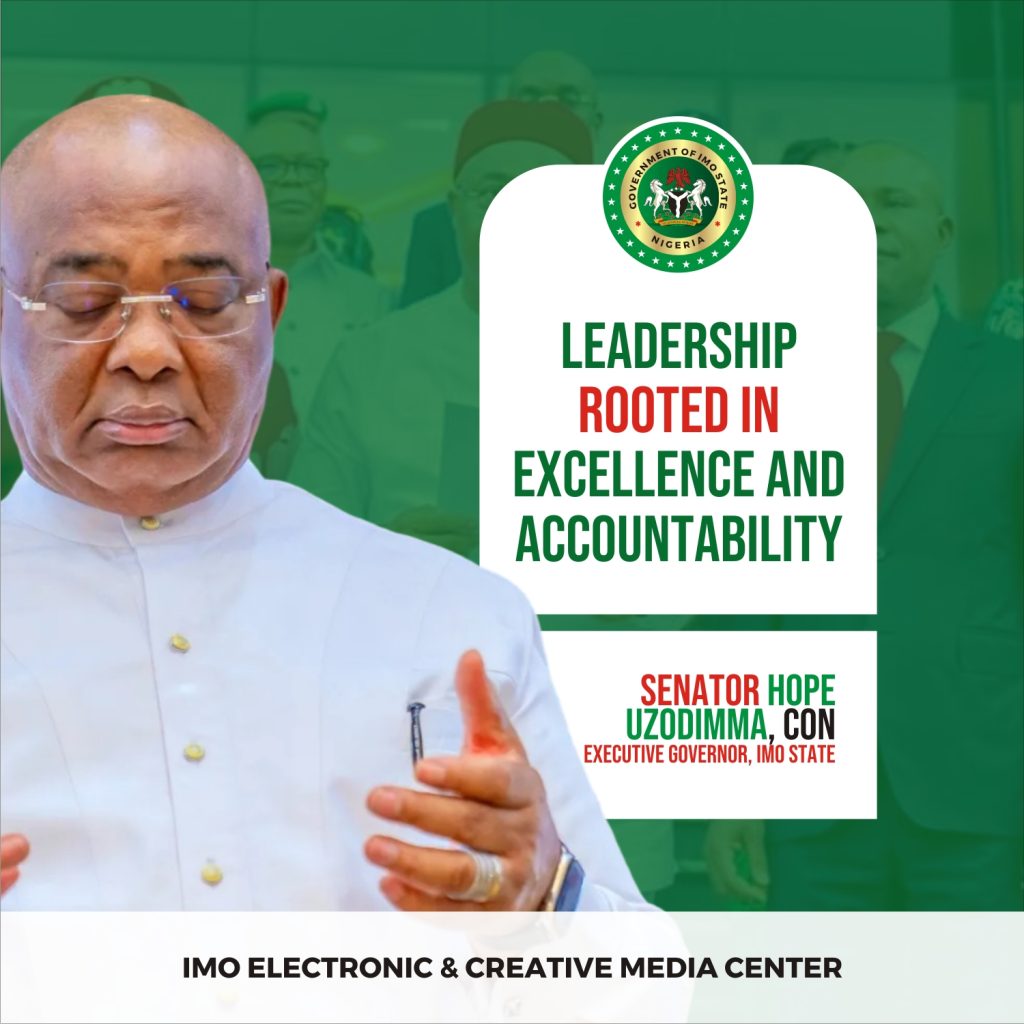
By Collins Opurozor- Imo
In his recent address to the Yoruba Tennis Club in Lagos, Governor Hope Uzodimma eloquently articulated a vision for Nigeria that is both urgent and timeless: the paramount need for meritocracy in driving national progress and development.
His reflections on the adverse effects of nepotism and favoritism, and his advocacy for a system rooted in merit, resonate deeply within the context of Nigeria’s ongoing struggle to harness its vast potential.
This call for a merit-based society is not merely a plea for fairness but a strategic imperative for unlocking the nation’s latent capabilities and propelling it toward a future of prosperity and unity.
Meritocracy, where individuals are rewarded based on their abilities rather than their backgrounds or connections, is the bedrock of any thriving society. In Nigeria, the pervasive practice of sidelining highly talented and qualified individuals due to their ethnicity or region represents a significant barrier to progress.
Governor Uzodimma’s poignant examples of high-scoring students being denied university admission in Nigeria, while their lower-scoring counterparts from favored regions gain entry, illustrate how these inequities stifle intellectual growth and innovation.
This systemic bias not only demoralizes capable individuals but also deprives the nation of the full spectrum of its intellectual capital.
The governor’s observations on employment further underscore this issue. When first-class graduates are overlooked in favor of less qualified candidates from different regions, it reflects a gross misallocation of human resources.
This practice not only demotivates the affected individuals but also hampers organizational efficiency and economic productivity. Over time, this undermines the quality of the workforce, stunts national growth, and perpetuates a cycle of mediocrity.
Implementing merit-based policies in education and employment is crucial for reversing these trends. University admissions, for instance, should be grounded in academic performance and other objective criteria rather than regional quotas or ethnic considerations.
This would encourage students across Nigeria to strive for excellence, knowing that their efforts will be rewarded fairly. Such a shift would raise educational standards and spur innovation, driving the nation’s intellectual and technological advancement.
In the job market, merit-based hiring practices would ensure that the most qualified candidates occupy key positions, enhancing productivity and innovation.
It would foster a culture of excellence and accountability, as individuals would be motivated to perform at their best, knowing their achievements will be recognized and rewarded. This meritocratic approach is essential for building a competitive and dynamic economy.
Moreover, promoting meritocracy would help bridge regional and ethnic divides. When opportunities are distributed equitably, it builds trust in the system and engenders national unity.
It sends a powerful message that Nigeria values all its citizens equally, regardless of their background. This inclusivity is crucial for social cohesion and stability, as it helps to mitigate the tensions and resentments that arise from perceived injustices.
Governor Uzodinma’s call for equality of opportunities is truly the midwifery of a just and equitable society. In a nation as diverse as Nigeria, ensuring that everyone has an equal chance to succeed is fundamental to nation-building.
It creates a sense of belonging and commitment to the nation’s development goals. Inclusivity is vital for tapping into the diverse talents and perspectives that drive innovation and progress. This enhances the nation’s global competitiveness.
Governor Uzodinma’s advocacy for meritocracy in Lagos, therefore, transcends mere fairness; it is a strategic blueprint for optimizing national development. By embracing merit-based policies, Nigeria will unlock the full potential of its people, promote innovation and build a more prosperous and united nation.
His address is a clarion call for all stakeholders to recognize the critical role of merit in nation-building and to take concrete steps towards institutionalizing it in all facets of national life.
This is an essential pathway to realizing Nigeria’s destiny as a great nation.
Collins Opurozor is the Special Adviser to Governor Hope Uzodinma on Electronic and Creative Media.
THE ROTTEN FISH: CAN OF WORMS OPENED OF APC & TINUBU'S GOVERNMENT OVER NIGERIA'S ECONOMIC DOWNTURN
WATCH THE CRITICAL ANALYSIS AND KNOW THE RESPONSIBLE PARTIES TO BLAME FOR NIGERIA'S ECONOMIC CHALLENGES, WHILE CITIZENS ENDURE SEVERE HARDSHIPS.Watch this episode of ISSUES IN THE NEWS on 9News Nigeria featuring Peter Obi's Special Adviser, Dr Katch Ononuju, 9News Nigeria Publisher, Obinna Ejianya and Tinubu Support Group Leader, McHezekiah Eherechi
The economic crisis and hardship in Nigeria are parts of the discussion.
Watch, leave your comments, and share to create more awareness on this issue.
#9NewsNigeria #Nigeria #issuesInTheNews #politics #tinubu THE ROTTEN FISH: CAN OF WORMS OPENED ...
DON'T FORGET TO SUBSCRIBE AND LEAVE YOUR COMMENTS FOR SUBSEQUENT UPDATES
#9newsnigeria #economia #economy #nigeria #government @9newsng
www.9newsng.com
